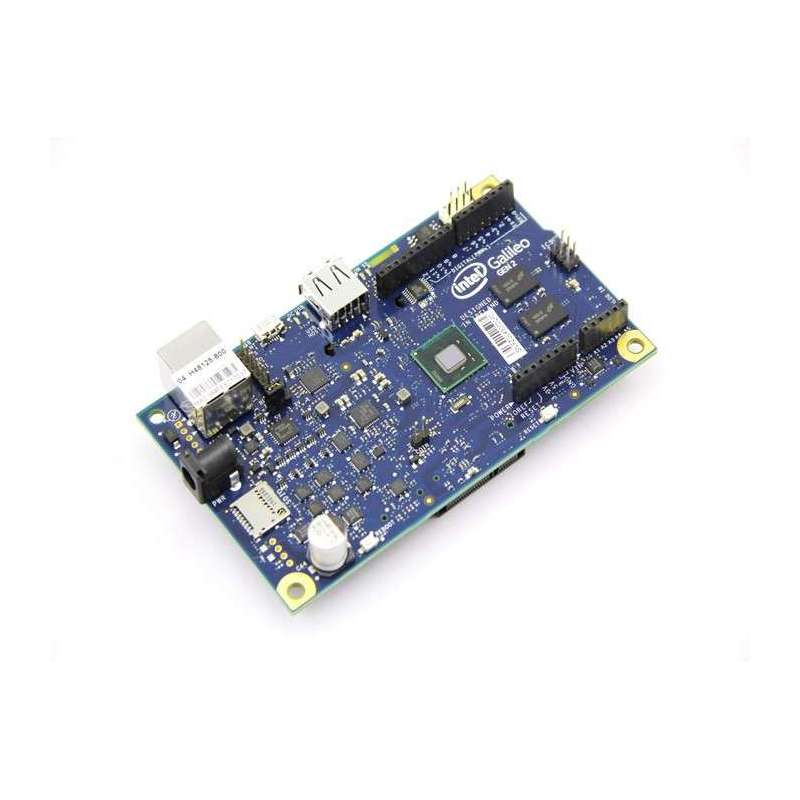Intel Galileo Gen 2 development board, the first in a family of Arduino-certified development boards based on Intel architecture and specifically designed for makers, students, educators and DIY electronics enthusiasts.
Based on the Intel Quark SoC X1000, a 32-bit Intel Pentium processor-class system on a chip (SoC), the genuine Intel processor and native I/O capabilities of the Intel Galileo board deliver great performance, and a broad spectrum of hardware peripheral and software support. The board also provides a simpler and more cost-effective development environment compared to the Intel Atom Processor- and Intel Core processor-based designs.
What’s new with Intel Galileo Gen 2
•6-pin 3.3V USB TTL UART header replace 3.5mm jack RS-232 console port for Linux debug. New 6-pin connector mates with standard FTDI USB serial cable (TTL-232R-3V3) and popular USB-to-Serial breakout boards.
•12 GPIOs now fully native for greater speed and improved drive strength.
•12-bit pulse-width modulation (PWM) for more precise control of servos and smoother response.
•Console UART1 can be redirected to Arduino headers in sketches, eliminating the need for soft-serial in many cases
•12V Power-over-Ethernet (PoE) capable (PoE module installation required).
•Power regulation system changed to accept power suppliers from 7V to 15V.
Features
•Intel Quark SoC X1000 application processor, a 32-bit, single core, single-thread, Pentium instruction set architecture (ISA)-compatible CPU, operating at speeds up to 400MHz.
•Support for a wide range of industry standard I/O interfaces, including a full-sized mini-PCI Express slot, 100Mb Ethernet port, Micro-SD slot, USB host port, and USB client port.
•256 MByte DDR3, 512 Kbyte embedded SRAM, 8 MByte NOR Flash, and 8 Kbit EEPROM standard on the board, plus support for MicroSD card up to 32GB.
•Hardware-/pin-compatibility with a wide range of Arduino Uno R3 shields.
•Programmable through the Arduino integrated development environment (IDE) that is supported on Microsoft Windows, Max OS, and Linux host operating systems
•Support for Yocto 1.4 Poky Linux release.
Specification
|
PROCESSOR FEATURES
|
|
Model
|
Intel Quark SoC X1000
|
|
Speed
|
400 MHz
|
|
Cores
|
1/1
|
|
ISA
|
32-bit Intel Pentium processor-compatible ISA
|
|
L1 CACHE
|
16 KB
|
|
SRAM
|
512 KB on-die, embedded; 800 MT/s
|
|
Technologies Supported
|
Integrated real-time clock
Optional 3 V coin cell battery for operation between turn-on cycles
|
|
STORAGE
|
|
Firmware
|
8 MB NOR Flash
|
|
DRAM
|
256 MB DDR3
|
|
SD Card (Optional)
|
Up to 32 GB
|
|
USB
|
Compatible with any USB 2.0 storage device
|
|
Eeprom
|
8 KB
|
|
SPECIFICATIONS
|
|
Dimensions
|
123.8mm (L) x 72.0mm (W)
|
|
Connectors
|
6-pin console UART
6-pin ICSP
10-pin JTAG FOR DEBUGGING
RJ45 Ethernet, Power over Ethernet capable
USB 2.0 Host (standard Type A)
USB 2.0 Client (micro-USB Type B)
Mini-PCI Express 1x slot
Jack with increased range (7 to 15 V)
|
|
Power
|
Supports Power-over-Ethernet (requires PoE module installation)
Header for RTC power
|
|
Buttons
|
Reset for sketch and attached shield resets 10/100 Mbps Ethernet
Reboot to reset the Intel Quark SoC X1000
|
Product Resource





